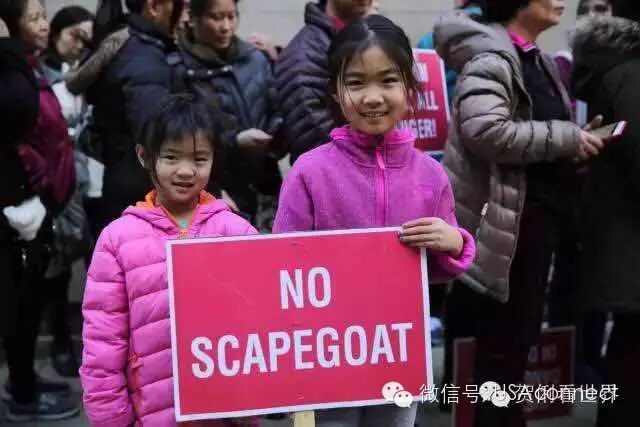2016-02-24 僑報綜合 美國在線
在2.20全美各地聲援華裔警官梁彼得的行動中,可以看到很多示威的海報上寫着:“今天我們沉默,明天我們的孩子就要繼續做替罪羊。”

但是,我們的發聲,我們的下一代真的知道、真的理解嗎?如果我們的努力,在子女看來不屑甚至反對,我們又該怎麼辦?
2.20這一天,這些年幼的孩子們,跟隨着自己的父母、祖父母等長輩參加了遊行,他們也許尚不知曉自己參加了可以載入史冊的在美華人最大規模的維權示威活動。



等這些年幼的孩子們再長大一些,會不會對父母的做法產生質疑?
我們今天所做的這一切,在我們的孩子們看來,是什麼樣子的呢?

近日,赫芬頓郵報的博客上登出的一篇華裔女孩寫的文章,或許可以幫助我們一窺端倪。在梁彼得這件事情上,華裔第一代移民和第二代之間,是有代溝的。這個代溝不僅僅是年齡和處事經歷,更有身份認同上的差異。
《赫芬頓郵報》博客全文翻譯
我是一個驕傲的美籍華人,但對於那些在上周末參加支持華裔警察梁彼得的示威集會的華人們,我感到有些失望。事實上,我的父 母和他們的許多朋友都前往參加了集會。此前非裔在舉行”非裔的命也是命“(Black Lives Matter protests)的抗議遊行時,包括我父母和他們的朋友都選擇沉默,或是躲得遠遠的。但當事件涉及華人時,他們選擇了給與關注,並且站出來。
令美國華人感到不公的是,梁警官被裁決有罪,但許多殺死手無寸鐵的非裔的白人警察卻一點兒事都沒有。這些白人警察包括將加納鎖喉致死的潘塔利奧(Daniel Pantaleo),在弗格森打死非裔青年的警察威爾遜(Darren Wilson),這些人都被判無罪。在梁彼得的案件中,”劇情“似乎更加曲折:梁彼得並沒有看見非裔青年格利出現在他面前,但是他卻”意外“地開了槍,子彈打中牆壁後反彈,再擊中格利。 我和我的父母一樣,對那些明確針對非裔的白人警察最終脫罪感到憤怒。我認為有關部門在對待梁彼得和對待潘塔利奧的方式上,有明顯的區別,尤其是當潘塔利奧還是一個經驗豐富的老警察,也意味着,他在處理類似事件上,更應該知道怎麼做。
梁警官所處的“體制”是腐敗,但這一切無法改變格利死亡的事實 。在這個體制中,警察被要求前往政府樓進行巡邏,只是為了尋找可能存在的“可疑行為”,而梁也就在在政府樓巡邏時擊中了格利。事發時,梁子在沒有及時威脅的情況下將手指放在扳機上也是事實,而當他發現格利被擊中後,沒有離開提供醫療援助,這也是事實。我希望梁彼得被定罪成為一個先例,今後我們必須將其他殺人的警察定罪。這不是第一次有非裔被警察在政府樓巡邏任務中被殺掉,如果我們不改變現狀的話,這也不會是最後一例。 我所說的現狀就是,每28個小時,全美就有一個手無寸鐵的非裔被警察或是類似齊默曼(George Zimmerman)的人殺掉。梁彼得殺死了一個父親、一個兒子、一個兄弟,他應該為此負責。
我要求我的爸爸將格利相信成他的兒子,而他在試圖進入公寓時,就毫無理由地被槍殺了。我爸爸立刻回應稱:“那想想如果梁彼得是你的兒子。” 這種將梁彼得想象成自己的兒子,而不是格利的思維模式,在許多東亞移民中其實廣泛存在。他們感到憤怒,是因為來自他們族裔的人遭遇到了不公平的待遇。而當非裔、南亞裔或是西裔遭遇到不公時,他們卻看不到,即使當一個人的命才等於另一個人15年的牢獄之災的時候。
我想許多亞裔美國人在關注梁彼得案件時,都是在關注他的個人,而不是整個破損的體制。這個體制是由許多像梁一樣的人組成的,無論是意外還是有意,他們都認為在沒有遭到切實威脅時,也有必要拔出自己的槍。在這個體制中,非裔甚至會因非暴力的毒品事件被判終身監禁,但是奪走無辜性命的警察,卻能逍遙法外,或是被判極短的刑期。
許多亞裔美國人都不認為警察暴力和他們有關,但在歷史上,白人至上主義就像是旋轉門,他們在不同時期將不同的種族看做是“不安全”的,評判的標準就是誰對他們有利。白人永遠可以找到理由,將某個族群貼上罪犯、間諜、恐怖分子等標籤,亞裔美國人當然也不會倖免。當我們被列為“歧視對象”時,我也希望其他種族能團結起來,就像亞裔現在必須要團結起來一樣。
我的父母將梁彼得看做是非裔維權時期的犧牲品,他們將他稱為“替罪羊”,特別是在梁彼得的案件就發生在小販加納被鎖喉致死案件後的4個月。我在看梁彼得事件時,我看到了改變的可能性——希望在維權人士對改變的堅持下,之後類似的案件可以公平的, 獨立的得到審理。梁的定罪,就是走向公平的一步。
在這起悲劇的事件中,唯一讓我感到欣慰的是,我終於和我的父母敞開心扉交談了一回,我希望我的美籍華人朋友也能利用這一次的機會,和他們的家人聊一聊。我是一個驕傲的美籍華人,我認為在這次維權過程中,我們必須打破沉默,讓外界注意到美國華裔在社會中的位置。
英文原文:
I'm Chinese American and I Think This Weekend's Peter Liang Protests Were a Problem, and an Opportunity
I'm a proud Chinese American, but today I am disappointed by those in my community who rallied this weekend in support of Peter Liang, the NYPD officer who killed Akai Gurley and was recently convicted of second-degree manslaughter. My parents and many of their friends attended these rallies or have spoken up in support of Liang. They have stayed silent and very far away from any Black Lives Matter protests, but they find the time to pay attention and show up when it is a member of their community.
Chinese Americans are arguing that it is unjust that Liang got convicted while the many white cops who have killed unarmed Black people before him walked free. White cops such as Daniel Pantaleo, who killed Eric Garner with a chokehold, and Darren Wilson, who shot Michael Brown, are regularly acquitted of these killings. In the case of Peter Liang, there are more ambiguities. At least as the official account goes, he did not see Akai Gurley before his gun accidentally discharged and his bullet ricocheted off a wall and fatally struck Gurley. I share my parents' outrage that white cops who much more clearly targeted unarmed Black folks have somehow gotten non-indictments. I think there are clear disparities between the way Liang was treated versus the way Pantaleo was treated, particularly as Pantaleo was a veteran cop who should have known better.
But that doesn't change the fact that Akai Gurley died needlessly because of a rotten system that Liang was part of. This is a system in which police routinely conduct unwarranted public housing patrols just to look for suspicious activity, which is what Liang was doing when he shot Gurley. The facts are that Liang had his gun on the trigger when there was no imminent threat -- he was there proactively, not in response to an event -- and when he did find out that Gurley was shot, he did not immediately provide medical care. I hope that Liang's conviction is a precedent, and that we will continue to convict, instead of letting cops who kill off the hook. This is not the first time that a cop has killed a Black person during a public housing patrol and it will likely not be the last time, if we maintain the status quo. The status quo is that an unarmed Black person is killed by cops and George Zimmerman types every 28 hours in this country. Peter Liang killed someone -- a father, son a brother -- and he should be held accountable.
I asked my dad to imagine that Akai Gurley were his son, killed for nothing more than trying to enter an apartment. He immediately responded, without stopping to actually consider my question, "but imagine if Peter Liang were your son." That he was willing to consider Liang but not Gurley as his son is indicative of a broader trend I see among many (East) Asian Americans. They are angry when they see injustice against people who look like them, but not when they see injustice against Black, Latinx, and Muslim/ South Asian communities. Other people of color are dehumanized to them. Even when the injustice is stacked a human life versus a possible 15 years in prison.
I think many Asian Americans are focusing on Peter Liang as an individual instead of as part of a system that's broken. The system is made of people like Liang who, accidentally or not, feel the need to have their guns out in the absence of provocation. It's also a system in which Black folks can face life sentences for nonviolent drug crimes, while cops walk free (or serve much shorter sentences) for taking innocent lives. Where is the outrage over that discrepancy?
Many Asian Americans fail to see this systematic violence as related to them, when in fact history has taught us that white supremacy is a revolving door that deems different groups of marginalized folks as "unsafe" based on what benefits white people at the time. White people will always find new reasons to profile people of color as criminals, spies, terrorists, and so forth, and Asian Americans are not immune. When the tide of favorability turns against us, I would hope that other people of color would stand in solidarity -- just as Asian American folks need to stand in solidarity now. The flawed logic of protesting one type of racism while implicitly condoning another, far more violent type of racism is bewildering to me. I saw people in the Liang rallies this weekend holding signs that quoted Martin Luther King Jr. and bore sentences like "injustice anywhere is a threat to justice everywhere." That they failed to see the irony in this escapes me.
My parents see Peter Liang as a victim of the mounting pressures of Black Lives Matter. They are calling him a "scapegoat," particularly as Akai Gurley's death happened just four months after Eric Garner's death. When I look at this situation, I see a potential for change -- change that happens case by case through activists fighting for change, through the criminal justice system, and through precedents. Liang's conviction is a step towards justice.
In the midst of tragedy, one small thing I am glad about is that this has opened up a dialogue between my parents and me -- a dialogue they are usually immediately resistant towards having. I hope that my Chinese American friends will also use this opportunity as a way to start conversations with family members. I'm a proud Chinese American, and I think it's our responsibility to challenge our silence and call attention to our role in this fight.
為人父母的一代移民,在思考如何與孩子溝通,如何引導孩子從法律、倫理道德、種族關係上理解自己看待梁彼得事件態度的同時,或許也有必要,思考自己與孩子們,這些儘管有着一副“中國”臉,但是土生土長的美國娃們在思考模式上的差異。
作為第一代華裔新移民,難免對美國社會的了解也有不全面之處,不妨和我們的孩子一起去學習其他族裔的文化,去關注其他族裔在美國的生存現狀,拓寬自己的世界觀,而不是帶着我們五千年文化和成人的傲慢、優越感,封閉在自己的思維方式里。或許這樣,這可以讓我們更容易理解子女的想法。
同時,如果我們更多地帶孩子感受中國文化,了解華人在美國生存的歷史和現狀,理解華人的視角,是不是也可以幫助他們成為真正的華裔美國人、在社會上找到自己的定位呢?
我們站出來了,作為華人群體發出聲音,進行思考,大膽質疑,也為華人父母和子女之間的代溝打開了一扇溝通的門。
那位華裔女孩在博客的結尾時寫到,在梁彼得和格雷的悲劇中,有一件小事讓她高興,這是第一次,父母願意和她溝通,談一談社會話題。或許,這樣的溝通可以延續下去。這樣,當我們站出來的時候,可以確定,我們的下一代也和我們在一起。









